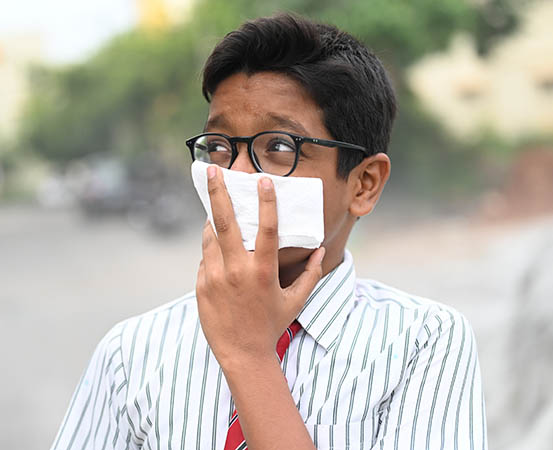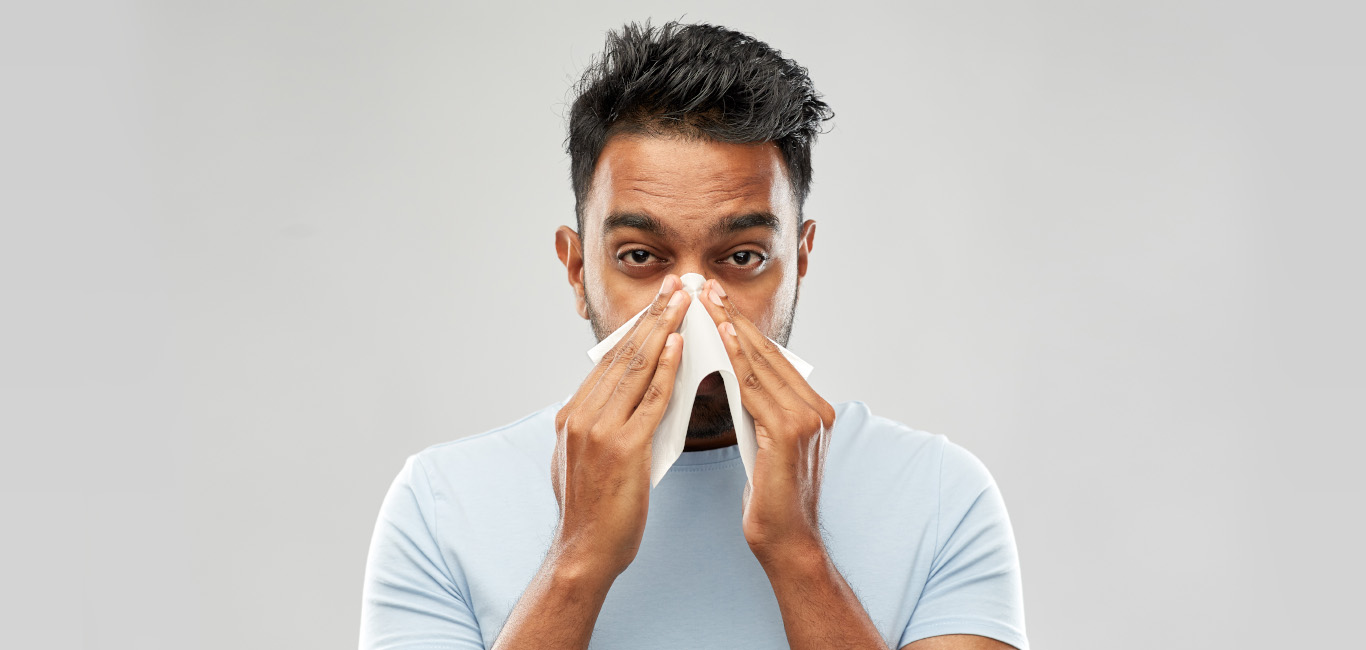
Hedrinia Shylla, a 22-year-old college student from Shillong, developed allergies out of the blue in 2015. She became allergic to dust mites and was diagnosed with allergic rhinitis. Because of her allergy, her nose gets irritated to the point of constant sneezing, watery eyes and itchiness in dusty home environments. “It gets worse during seasonal changes,” says Shylla.
When Shylla moved to Bengaluru in 2019, she was residing in a student’s hostel. The change in her surroundings made her allergies worse. “I always woke up with morning sneezes and cleaned my room every day to manage my allergies. Taking anti-allergy medications helps when I sneeze repeatedly, so does wearing a mask,” shares Shylla.
Rhinitis is something that we all experience during infections like the common cold, when the inner lining of our nose gets inflamed by viruses or other pathogens. However, allergic rhinitis, commonly known as allergy, refers to the inflammation of the nasal passage due to an allergic reaction to certain allergens like pollen (hay fever), dust mites, molds, etc. It can cause repeated sneezing, runny nose, itchy eyes, and tiredness.

Causes of allergic rhinitis
“It can develop at any age and is genetic in nature,” says Dr Alap Christy, associate vice president & scientific business head, clinical chemistry, Metropolis Healthcare, Mumbai.
“In people with allergic rhinitis, the body produces a similar reaction to foreign particles [allergens] like the way it would react to pathogens like bacteria and viruses,” explains Dr Aparna H Mahajan, ENT specialist, Amrita Hospital, Faridabad.
She adds that allergies can develop anytime in one’s life, mostly due to a change in the environment (like relocation). “It also impairs the quality of life. Besides experiencing dizziness and malaise [a general feeling of discomfort with no known cause], one also feels easily tired.”
Symptoms of allergic rhinitis are restricted to the upper respiratory tract. “While all forms of rhinitis have common signs like runny nose and sneezing, non-allergic rhinitis like infectious rhinitis of viral or bacterial origin is often characterised by fever and body aches,” explains Dr Christy.
Diagnosing allergic rhinitis
Primary tests for diagnosing allergic rhinitis include:
- Blood (specific IgE) test: This test is carried out to measure the amount of immunoglobulin E (IgE) in the blood in response to an allergen. “An allergen is identified by the specified amount of IgE that it produces,” says Dr Christy.
- Skin prick test: “This test is quite sensitive and specific to people with allergic rhinitis, wherein several allergens are tested both from the environment and food by pricking the skin,” says Dr Mahajan. However, it is not reliable as it does not provide a quantitative result and requires the skin to be pricked many times.
Complications of allergic rhinitis
“Immunogenicity [ability of a foreign particle to provoke an immune response] of many people changed after contracting COVID, which triggered allergies in those who never had it before and worsened the symptoms in those who already had allergic rhinitis,” says Dr Mahajan.
She further adds that increased hypersensitivity to allergens can cause severe allergic rhinitis, leading to conditions like sinusitis, ear pain or reduced hearing due to blocked ears and earache.
“If a person has a tendency of developing allergic rhinitis, then he/she may also have asthma. This is why many people with allergic rhinitis are also asthmatic,” clarifies Dr Mahajan.

Treatment
While allergic rhinitis is a lifelong condition that has no cure, the symptoms can be kept under control with various medications as well as early identification of allergens and avoiding their exposure, says Dr Christy.
Short term relief through symptomatic treatment can be provided by over-the-counter allergy medications like antihistamines and nasal sprays. “Nasal sprays do not have long-term side effects and can be taken for a longer duration,” adds Dr Mahajan.
One can also take holistic approaches like homeopathy or ayurveda to manage allergic rhinitis.
“Although antihistamines reduce the symptoms, immunotherapy can be the long-term solution, as it focuses on reducing sensitivity to the allergen itself,” explains Dr Christy.
“For someone who cannot avoid exposure to allergens in the environment like animal dander or pollen, or whose symptoms do not improve with conventional treatment, immunotherapy can be considered to manage the symptoms with an efficacy of up to 80 per cent,” adds Dr Mahajan.
Takeaways
- Allergic rhinitis is characterised by inflammation of the nasal passage as a result of exposure to allergens in the environment.
- Symptoms include repeated sneezing, itchy eyes, and a runny nose. Most people with allergic rhinitis are also asthmatic.
- Allergic rhinitis can be managed with the help of antihistamines and nasal sprays. Immunotherapy can be considered if symptoms do not improve.

















